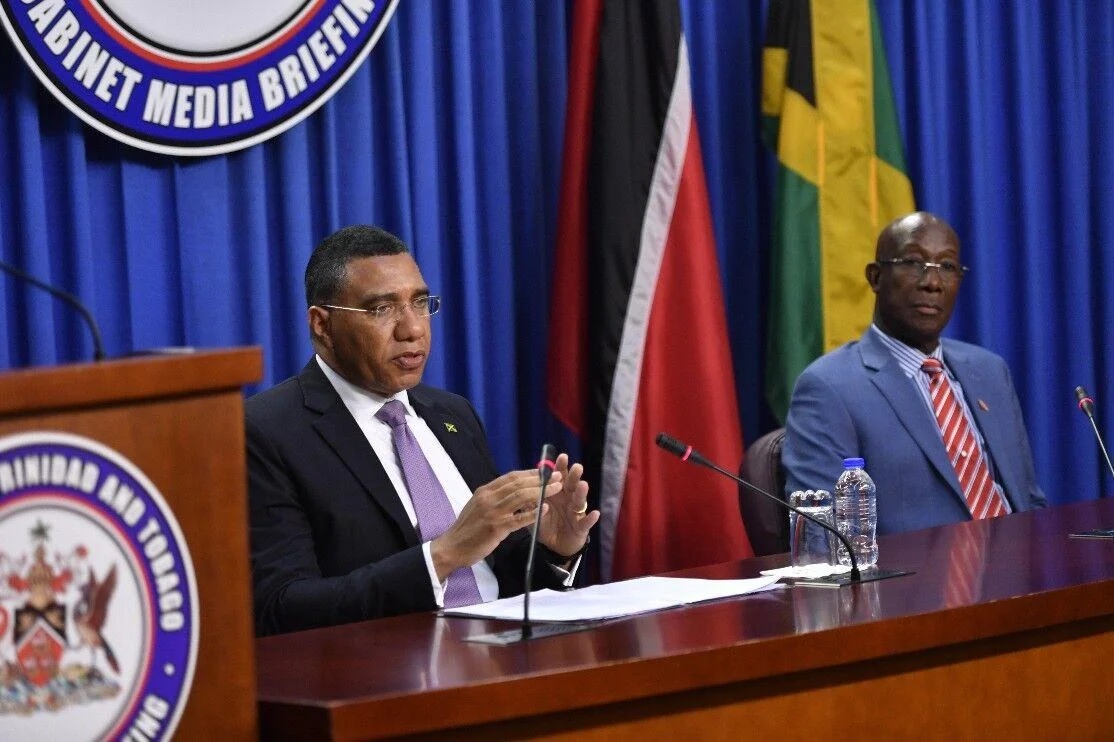(Trinidad Express) Jamaica and Trinidad and Tobago are battling a similar crime problem, says Jamaica’s Prime Minister Andrew Holness.
Speaking yesterday at a joint news conference at the Diplomatic Centre, St Ann’s, Holness and Prime Minister Dr Keith Rowley expressed concern about the inflow of arms and ammunition from the United States into the region.
Holness is in Trinidad and Tobago for an official visit and as a guest for Trinidad and Tobago’s 60th anniversary of Independence celebrations. Tomorrow, August 31, is Independence Day.
Noting that the United States has just made a statement on the flow of arms and ammunition into the Caribbean, Rowley said, “That did not come about by accident and came about after pressing the point that the US is the supplier of most of these items.”
Rowley emphasised the need for closer collaboration on this fight.
Holness said there is need for an amplified front with respect to the inflow of guns.
“It’s amazing when we exchange notes on the national security front, the similarities and commonalities not just on the violence front but the elements that fuel it and enable it so weapons are an enabler of violence, how they get into our countries, the people who are financing it and selling, there is an incredible level of commonality,” he said.
Holness noted that Rowley had declared violence as a public health issue and the same is happening in Jamaica.
“It is important that the populations come to a realisation that countries like ours with our economic stage and profile and culture as well as historical factors do play a role and explain why violence is used often and is the choice to resolve conflict,” he said.
Enterprise crime
Holness said Jamaica is facing a challenge of illegal guns through both legal and illegal ports.
“If it is coming in through your ports, it speaks to a high level of possible corruption in the court system in the custom system,” he said.
He said Jamaica’s crime plan is multi-dimensional and looks at all elements of national security.
Holness said the challenge is managing “enterprise crime” – criminal gangs whose sole purpose is to infiltrate State organisations, corrupt institutions and use that power that they gain to facilitate illegal trade, whether it is narcotics from South or Central America, human trafficking, etc.
He also shared concern about domestic crimes which are featuring more prominently in Jamaica.
Without giving specifics, Holness referred to a domestic crime where several people were murdered.
In June this year a mother and her four children were found dead with their throats cut in Jamaica. A male relative was arrested.
The bodies were discovered in Clarendon parish, west of the capital Kingston.
Kemisha Wright, and her four children, Kimana Smith, 15; Shemari Smith, ten; Kafana Smith, five; and Kishaun Henry, 23 months, were identified as those killed.
Holness said all this violence makes the quality of life that people enjoy less.






